Yakuza: Like A Dragon Job Guide - Every Unlockable Job And Which Ones Are Worth Your Time
Here's everything you need to know about jobs in Yakuza: Like a Dragon.
Yakuza: Like a Dragon has gone full-on RPG, and that means introducing classic RPG elements like a character class system. These classes are called “jobs” (a la Final Fantasy) and offer the chance for characters to learn new skills, get a boost to stats, and generally break out of their default roles. While it’s possible to finish the game without changing jobs, exploring the system to its fullest will make your adventure a lot more satisfying, and gets you a few important skills that carry over between jobs. So which jobs are worth using, and which careers are best left ignored? Read on to learn all about your job options. For our thoughts on the game, be sure to read our Yakuza: Like a Dragon review.
What is the Job System?
Kasuga and company will be able to learn and use different combat skills from changing their jobs. Jobs can be changed starting in mid-chapter 5 at Hello Work. Talk to Ririka and she will give you a list of available jobs for each character. Not all jobs will be available immediately--some will require characters to be at certain experience and bond levels to be selectable. In Kasuga’s case, some jobs will require both a certain experience level and his various attributes to be at certain levels.

There are separate job sets for male and female characters. Also, every character has at least one job that is unique to them that no other character can use. (Kasuga has two.)
How Do Jobs Work?
After a fight, you get both character EXP and job EXP. Your chosen job levels up separately from your character. At certain levels, you will either learn a new, job-specific technique or get a permanent stat boost.
While most skills you learn from job levels are only usable while the character is in that job, each job has two “Character Skills” that will always be available once learned, even when you switch over to other jobs. Some otherwise mediocre jobs are worth leveling simply to get access to the character skills. Party members will also get unique skills every five character levels that are usable regardless of job, and Kasuga can earn additional skills through the business management minigame.
What About the DLC Jobs?
There are two optional DLC jobs, the Devil Rocker for males and the Matriarch for females. Since these are paid DLC that isn’t a part of the base game, we’re leaving them out of the guide.
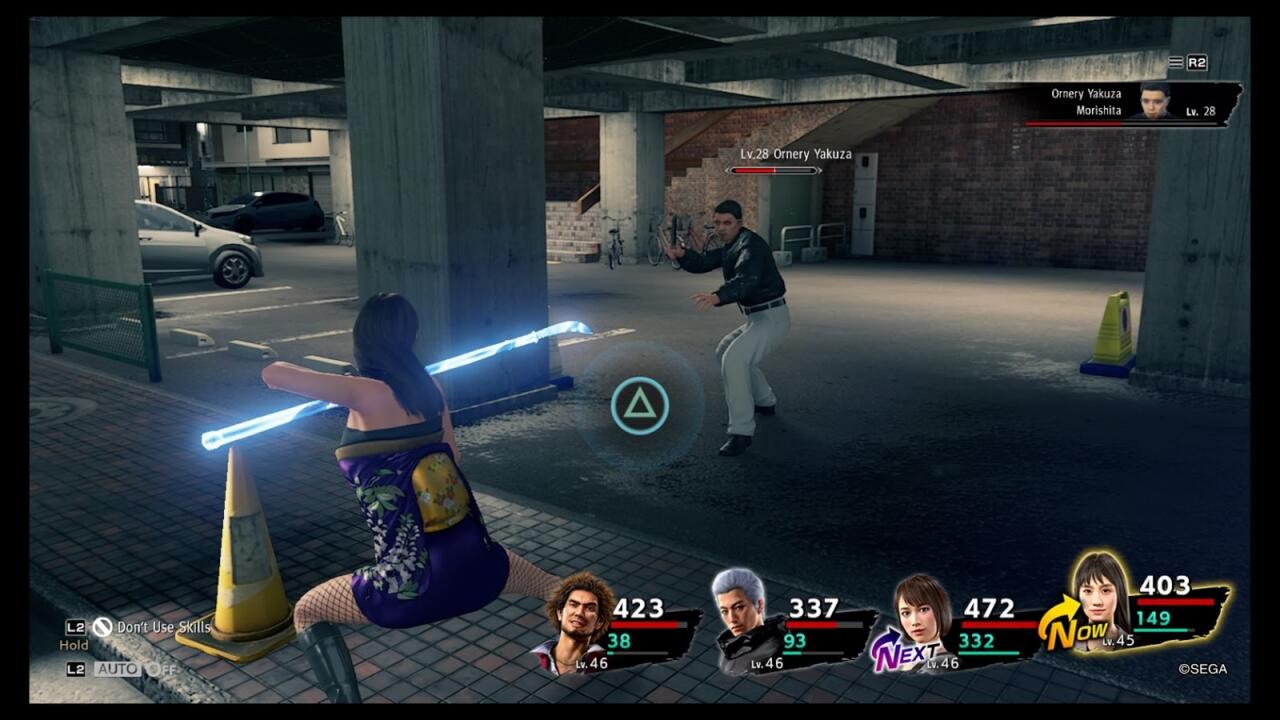
When Should I Start Exploring the Job System?
As we wrote in our starter guide, it might not be a good idea to start job-swapping right away, as it’s much harder to level jobs and get skills in the early part of the game, and you will lose access to many skills you’ve become accustomed to. (One exception: Saeko is best switched to an Idol ASAP.) With most of Chapter 6 being a long series of fights, Chapter 7 is a better time to start playing around a little bit more, especially if you recruit Eri into your group through the business management minigame. You’ll also have more funds for buying weapons, which are unique for each class.
It’s also significantly easier to get job levels and skills towards the end of the game, as you’ll have access to the Battle Arena starting in Chapter 12. Each of the fights in the Battle Arena rewards a substantial amount of job experience, and you can gain job levels very quickly there from even the lower-level fights. (You’ll also want to grind levels and earn gear there to aid in Chapter 12’s extremely rude boss fight.)
Unique Character Jobs
Freelancer
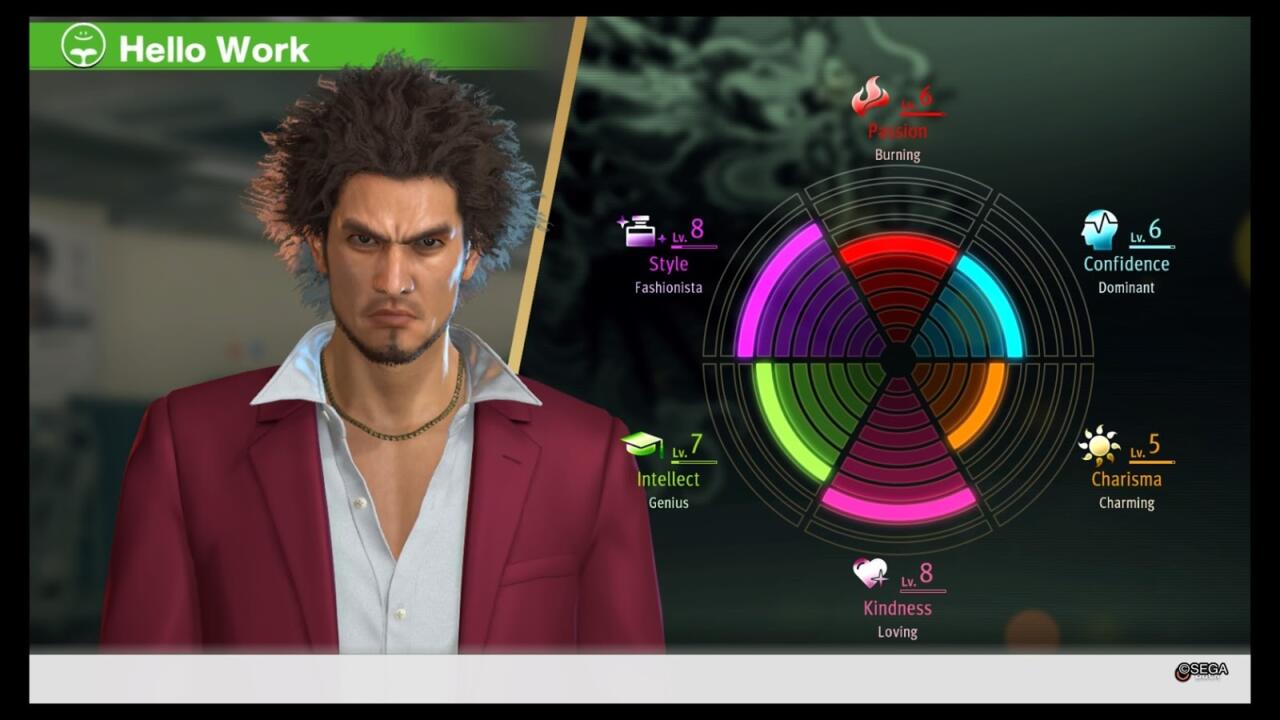
Default/Exclusive class of Kasuga Ichiban
Freelancer is the job that attempts to carry over the raw, bare-knuckle fighting of the previous Yakuza games directly into Like a Dragon. It’s also the job that Kasuga starts with and has access to for the entire game. And it is quite good at offense, as the attacks hit hard and can give bonus effects like stun. The critical damage rate for this class and its skills is also quite formidable.
However, one big issue with this class (and quite a few classes we’ll cover) is a lack of options. There are no support abilities beyond self-buffs, and all attacks are based on blunt force damage, which numerous enemies have resistance to. Compared to the Hero class Kasuga gets shortly afterwards, which is about as well-rounded as a skillset can get, Freelancer feels very restrictive. Yes, the hits feel satisfying, but the visceral pleasure of beating the snot out of someone gets dampened when they don’t take full damage from what you’re dishing out.
TWO-SENTENCE SUMMARY: It’s a solid offensive class, but extremely limited. It pales in comparison to the Hero class in terms of combat versatility.
Hero
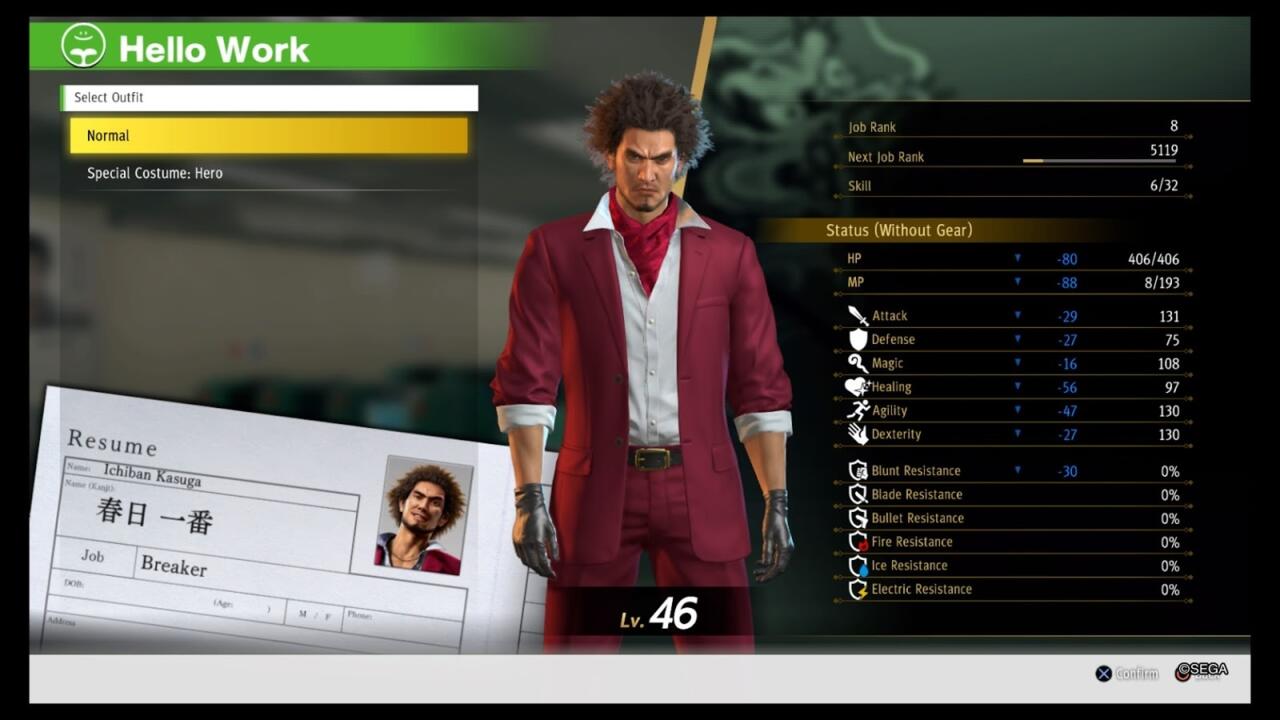
Exclusive class of Kasuga Ichiban, unlocks during Chapter 4
Hero is the jack-of-all-trades class you’d expect from an RPG protagonist. It’s got damage dealing, a little bit of support, and a little bit of healing and revival to make for a very versatile Kasuga. These skills’ potency will also be boosted as Kasuga raises his various parameters like charisma and passion, making them even better as the game progresses. Perhaps the only downside is that the Hero’s damage typing lacks variety: it’s all physical blunt force damage, which several enemies have resistance to. If you bring in a couple of offensive character skills from other classes, you can help make up for this. Ultimately, Hero will be Kasuga’s best option for the endgame challenges.
TWO-SENTENCE SUMMARY: Hero offers almost everything you’d want a job to provide. What it doesn’t do, you can learn in other jobs and carry over.
Homeless Guy
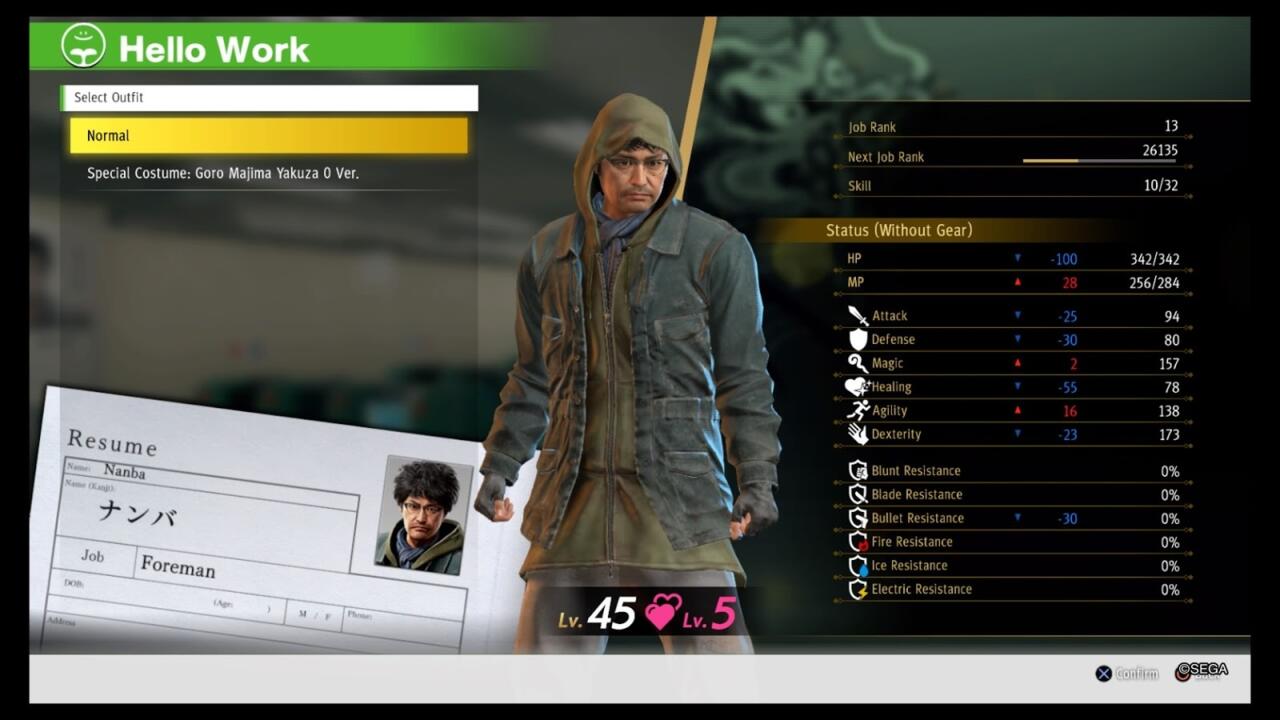
Exclusive class of Nanba
This is essentially the equivalent of a magic-using class in more traditional RPGs. Nanba is the Homeless Guy class acts as the token magician--a pyromancer, to be exact, since many of his attack spells will turn him into a human blowtorch. He’s also got a good range of debuffs and healing spells to complement his fire-wielding, making him a great all-around offensive magic and support character.
Unfortunately, the usual drawbacks of magic users apply: his physical attack power isn’t too good, and defense can be a serious problem. While he has a few non-elemental magic skills, his stronger attacks being fire-based means that he won’t be quite as effective against foes with fire resistance. As a whole, however, this class is great, and it can be even better with carryover skills from jobs like Musician and Fortuneteller.
TWO-SENTENCE SUMMARY: An excellent magic-using job. Its weaknesses are easily compensated for by carrying over skills from elsewhere.
Detective
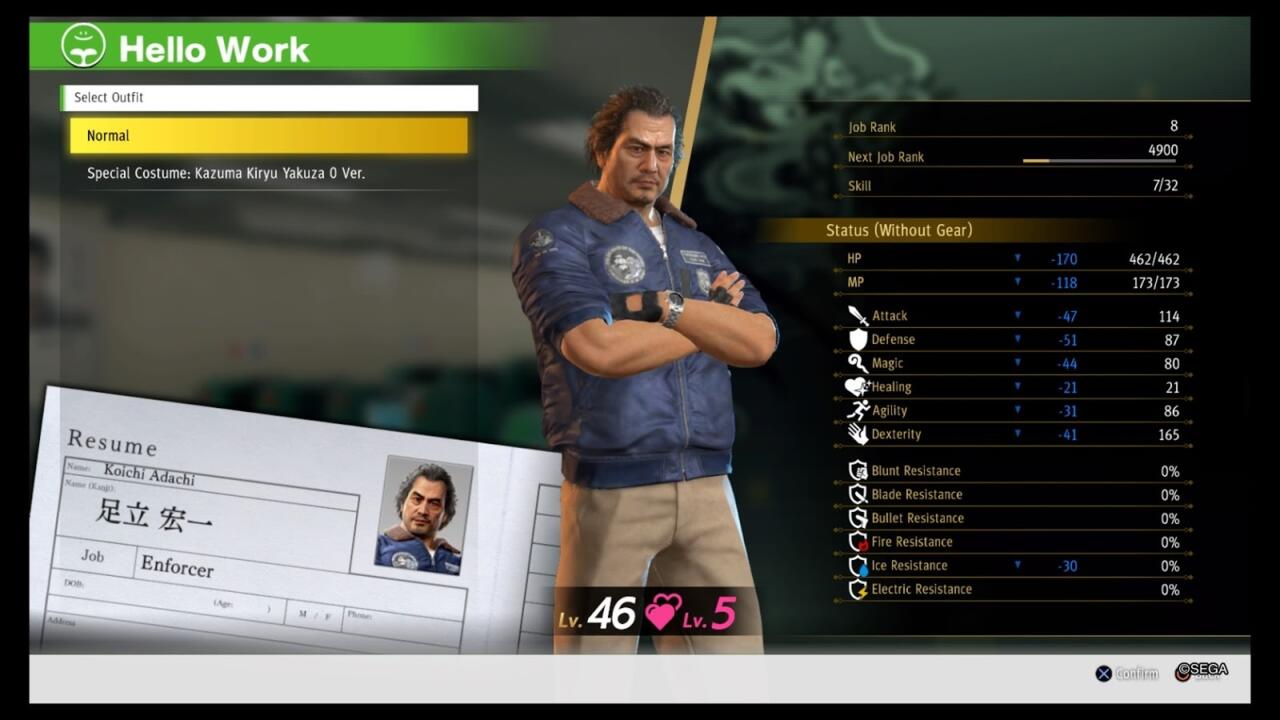
Default/Exclusive class of Adachi
Ex-cop Adachi’s specialty is riling opponents up and locking them down. He has several skills which can cause enraged status, making enemies unable to do anything other than target him with normal attacks. This way, he can act as a tank, taking the hits and smacking enemies down with additional blunt-damage skills that can cause status afflictions like stun if Adachi’s HP is high. It’s a solid enough tank-y class.
However, once Adachi gets access to the Enforcer job and some good gear for it, Detective pales in comparison. Fortunately, the Character Skills from Detective work extremely well when carried over to Enforcer, so there’s some value in spending time with this class… mostly because switching to Enforcer right away can be pretty tough.
TWO-SENTENCE SUMMARY: Detective will carry you a decent way into the game. You’re going to want to swap out eventually, though.
Hitman
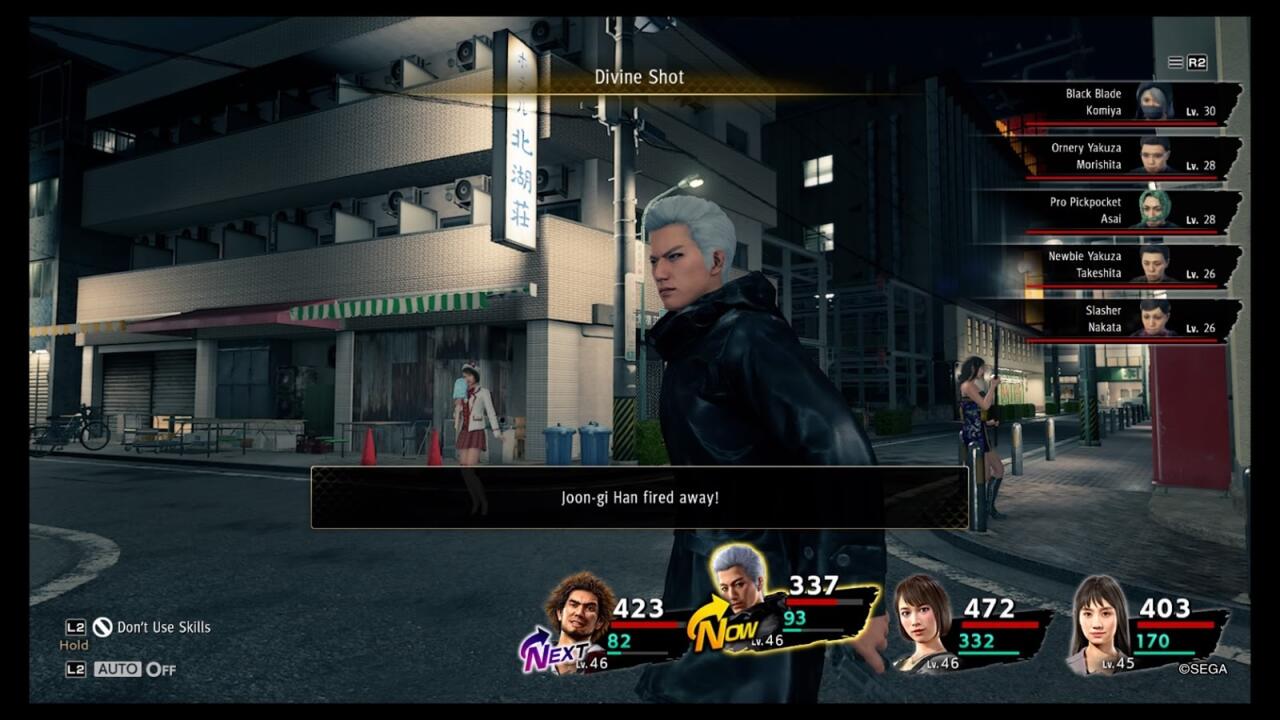
Default/Exclusive class of Joon-gi
Hitman is Joon-gi’s starting class, and it’s a doozy. It’s built around doing lots of damage in lots of ways very quickly. One of the biggest upsides is that you have access to both blunt and rare (and rarely resisted) gun/piercing damage through skills, making a Hitman Joon-gi extremely adaptable to a lot of different combat situations. Some of his skills can also add status ailments, but the success rate is pretty low, so you’ll mostly be focused on outputting damage rather than inflicting status. Also, while most of the skills at early job levels are single-target, he’ll earn an amazing multi-target piercing attack in Heavenly Shot at job level 16, making Joon-gi one of the best mob-clearers in the game.
While the class makes good use of Joon-gi’s high agility, it does little to offset his low defense, making him a bit of a glass cannon unless you have gear to bulk him up. Low MP is also an issue in a class that’s so skill-dependant, though accessories can help remedy that a bit. If he’s really in trouble during combat, one option is the unique Banshee Bayonet skill, which makes him untargetable until his next turn--though that applies to both enemies and allies. Overall, Hitman is an excellent offensive class that works well in almost every party configuration and situation.
TWO-SENTENCE SUMMARY: Really fast and versatile beatdowns that are effective against a wide variety of foes. Highly recommended.
Gangster
Default/Exclusive class of Zhao
Do you like punching? Do you like stabbing? Well, with the Gangster class, you get to do both! Zhao’s an offensive monster as a Gangster, wielding both bashing blunt martial arts skills and slashing sword skills, including his standard attack. The damage is big, and with some skills, you can apply additional effects like defense down and bleeding, which is a nice bonus. With access to two attack types (some with debuffs attached) and high pure damage output, Gangster is perhaps the game’s most formidable attack class.
However, if you’re looking for anything more than pure offense, you definitely aren’t going to find it in this class. With no support or recovery skills, Zhao will be reliant entirely on items for healing and buffing options. Of course, you can take a bit of time to build some other jobs and carry the skills over to give him more options… or just add a larger variety of damage sources.
TWO-SENTENCE SUMMARY: Offense, offense, and only offense. Be prepared to carry over some skills if you want anything besides damage dealing.
Barmaid
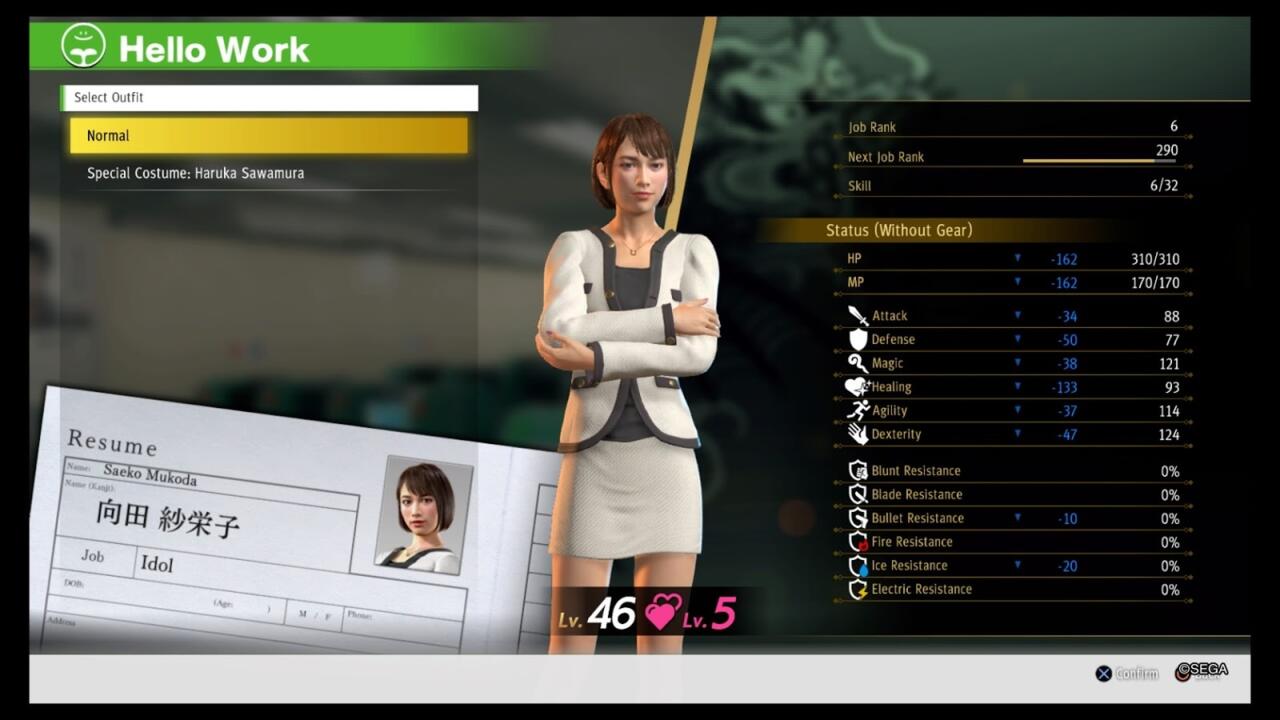
Default/Exclusive class of Saeko
Barmaid might just be the most mediocre default job in the game. It’s got a decent mix of single-target offensive skills and self-buffs, and several of the attacks also have various debuffs or status ailments attached. However, a severe lack of multi-target attacks and damage variety really hurts, as does the inability to provide support to anyone except herself. It’s not the worst job, but it’s really hard to justify using this over many better women-only classes. Early-game Saeko is better off as an Idol for support, and late-game Saeko can get better offensive character skills from jobs like Night Queen and Gambler, making the Barmaid feel mostly irrelevant.
TWO-SENTENCE SUMMARY: Not a particularly noteworthy job. Saeko won’t be hurt much if you switch out of it right away.
Clerk
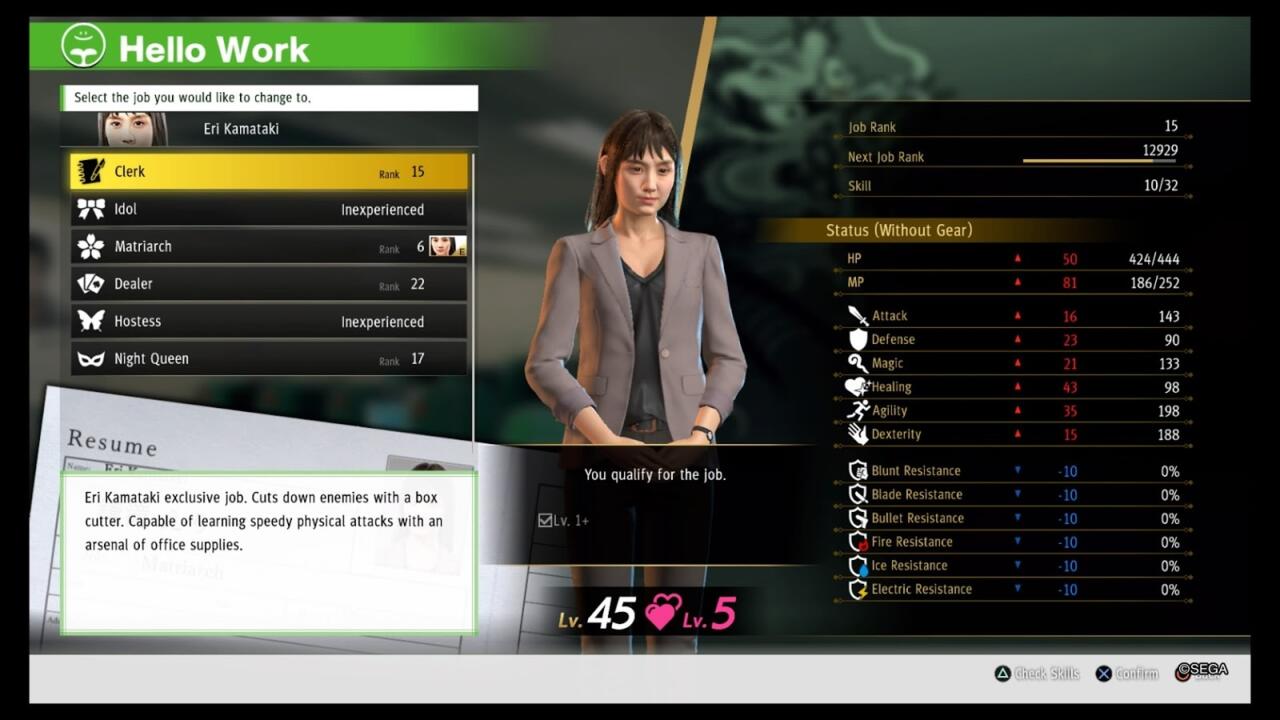
Default/Exclusive class of Eri
Eri is the game’s only optional party member, and she comes into the party with this job in tow. But despite her demure appearance, the swift-acting Clerk is capable of a lot of serious pain. Eri wields office work implements as weapons of mass destruction, including deadly boxcutters that deal slash-type damage with normal attacks. Her skills offer a bit more attack variety, with both blunt and slashing techniques at her disposal, almost all of which can cause various status afflictions. Even better, her Rolling Kick skill gets extra damage on enemies with status ailments.
Much like Zhao’s default class, however, Clerk is heavy on the offense and light on most everything else. It comes with a self-recovery skill, but that’s about it. And aside from Thumbtack Scatter--which is quite good--the job lacks AOE attacks. But when she’s hitting fast and hard with damaging attacks and very potent status afflictions, these aren’t as big of issues as they might sound.
TWO-SENTENCE SUMMARY: Excellent damage and debuff potential. Make every day secretary’s day!
Male-Only Jobs
Breaker
Breaker is similar to the Hitman class in that it’s built around doing lots of damage very quickly. It is indeed quite fun to smash enemies with a barrage of funky-fresh dance moves! Some skills have a random chance to grant self-buffs in addition to dealing damage, which is nice. The final two skills, Essence of Rolling Mixer and Essence of Breakdance Delight, do excellent double duty as attack skills that remove status ailments and restore party HP.
The big issue with Breaker, however, is a severe lack of variety. What makes Hitman so good is the ability to use different damage types depending on the situation. In contrast, all of the Breaker’s attacks deal blunt damage, meaning that if you’re up against enemies who resist that kind of damage, the Breaker’s effectiveness is severely hampered. Low defense also puts a character at risk if the enemy lands a few lucky hits. The two character skills you can learn, Atlas Hold and Double Hatchet, can carry over well into other classes due to their self-buff capabilities, but beyond that, it’s hard to recommend staying as a Breaker for extended periods of time… unless you know that forthcoming encounters will be solved primarily by punches and kicks to the face.
TWO-SENTENCE SUMMARY: This class would be fantastic if you had access to more than one type of damage. As it is, it’s good but not amazing.
Foreman
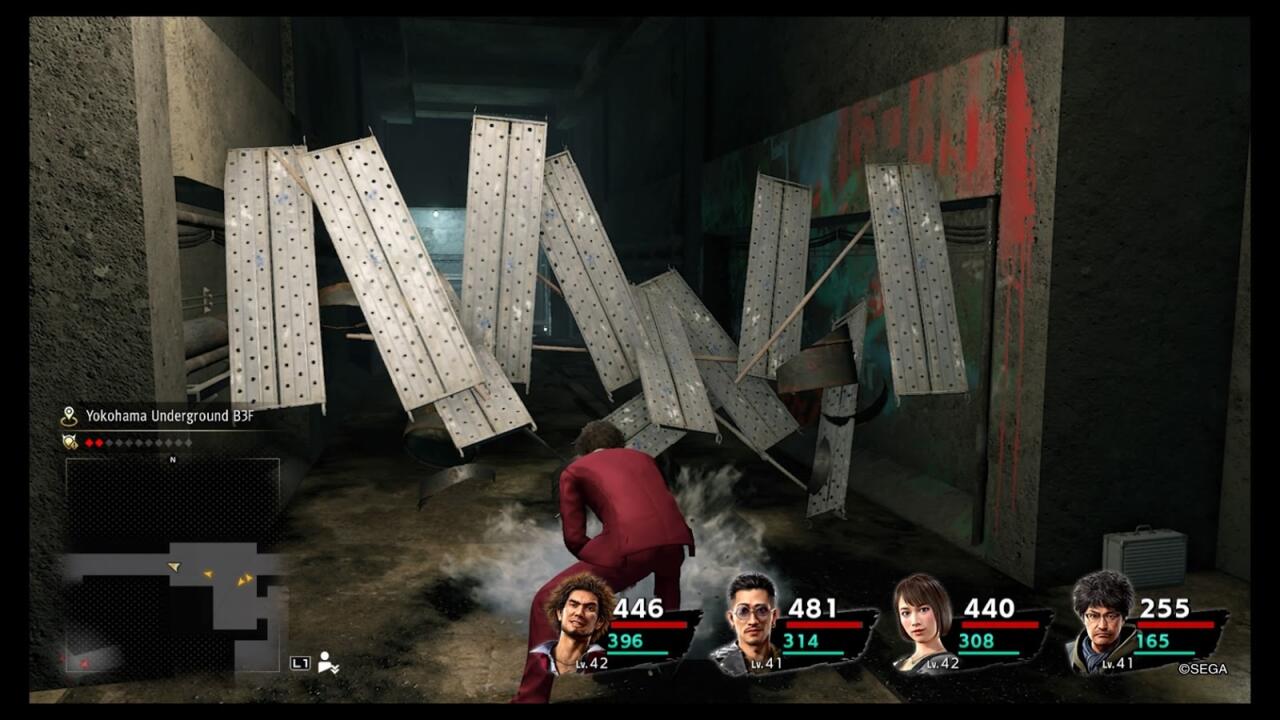
As you might expect from a job that wields a giant wrecking hammer, Foreman is a class with great offense. You’ll learn a bunch of hammer-based attack skills that target both single enemies and groups, along with a handful of fire-based magic explosive attacks. It’s a solid class in terms of defense, too: levelling the job will give you boosts to both HP to absorb hits and MP to use all of your skull-crushing skills. (You also get an extra 30% bullet/pierce resistance as a nice little bonus, though this damage is much less common for enemies to use than slash damage.)
The Foreman’s biggest drawback, however, is that it’s quite slow. Not just in terms of raw stats either: many of the best skills, like Master Hammer, take an extra turn before they activate, meaning that there’s plenty of time for the enemies to react or interrupt. Still, when the attacks land, they hurt a lot. It’s up to you to decide whether or not you want to chance playing the waiting game, especially when other classes can deal a good amount of damage without having to charge up.
Also, take note: You’ll want to switch Kasuga to this class at least once, even if you never plan on using it for him. You get an exploration skill, Demolish, which will allow you to break down certain walls. If you plan on exploring the optional underground dungeon, this skill is mandatory.
TWO-SENTENCE SUMMARY: Not a bad class, but difficult to use in certain situations. Patience and foresight are a must if you want the Foreman to be effective.
Musician
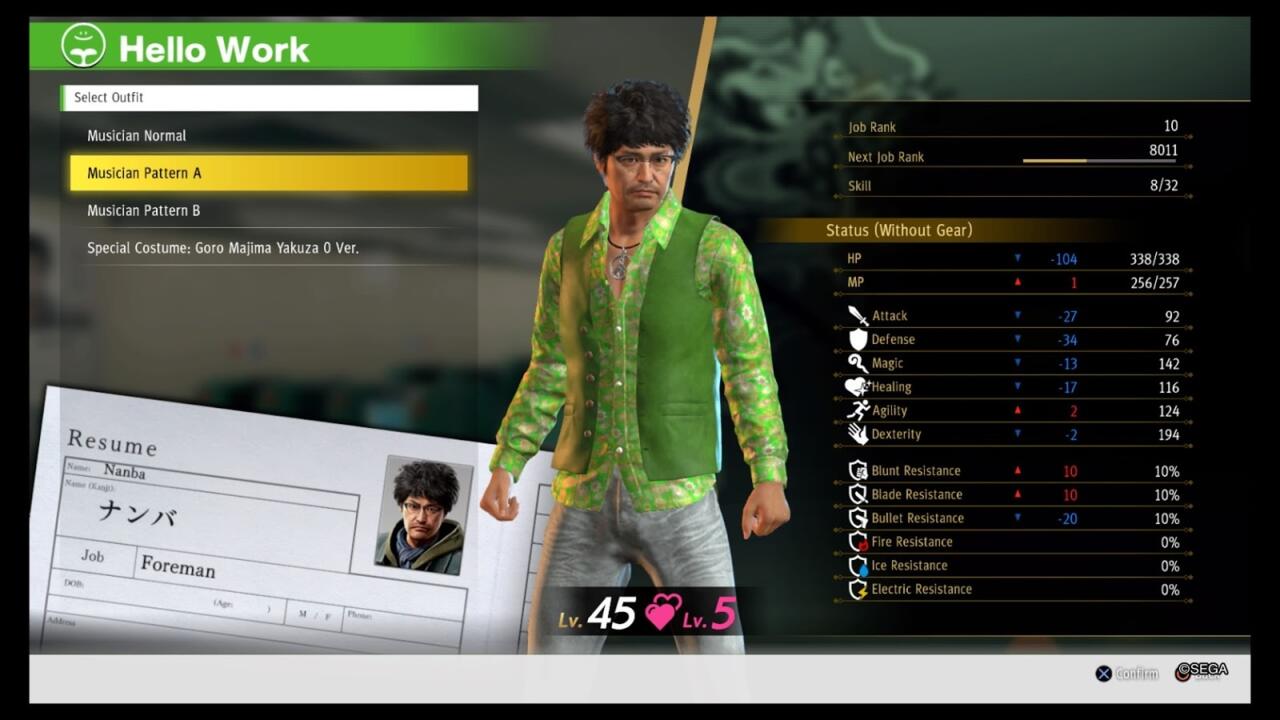
The Musician’s a weird one. It’s kind of a support class, but also kind of an attack class. Its gameplan revolves around raising “Voltage,” which can be randomly gained after executing certain skills, and then using other skills that get damage boosts based on how much Voltage you have. It’s a fun idea, and who doesn’t love the idea of singing your way to victory through buff-granting tunes? But re-read that sentence above--you randomly gain Voltage. With most skills, it’s not guaranteed, and the only skill where it is guaranteed is a counter technique that requires a different random factor to work. If you want to use the Musician to its fullest, you’ll be stuck using a bunch of standard skills, some you might not need, and crossing your fingers that you get that voltage boost. (There’s also another gimmicky skill, Album Drop, that increases in power not through voltage, but through how many members of the active party are Musicians. It’s quite unlikely you’ll want more than one.)
However, it may be worth spending time as a Musician simply for the character skills, both of which are very good. Endless Desire gives the entire party a health-regeneration buff, while Be my Shelter is a skill that restores MP--a valuable rarity.
TWO-SENTENCE SUMMARY: Fun, but really gimmicky. There are better options for both damage and support.
Host
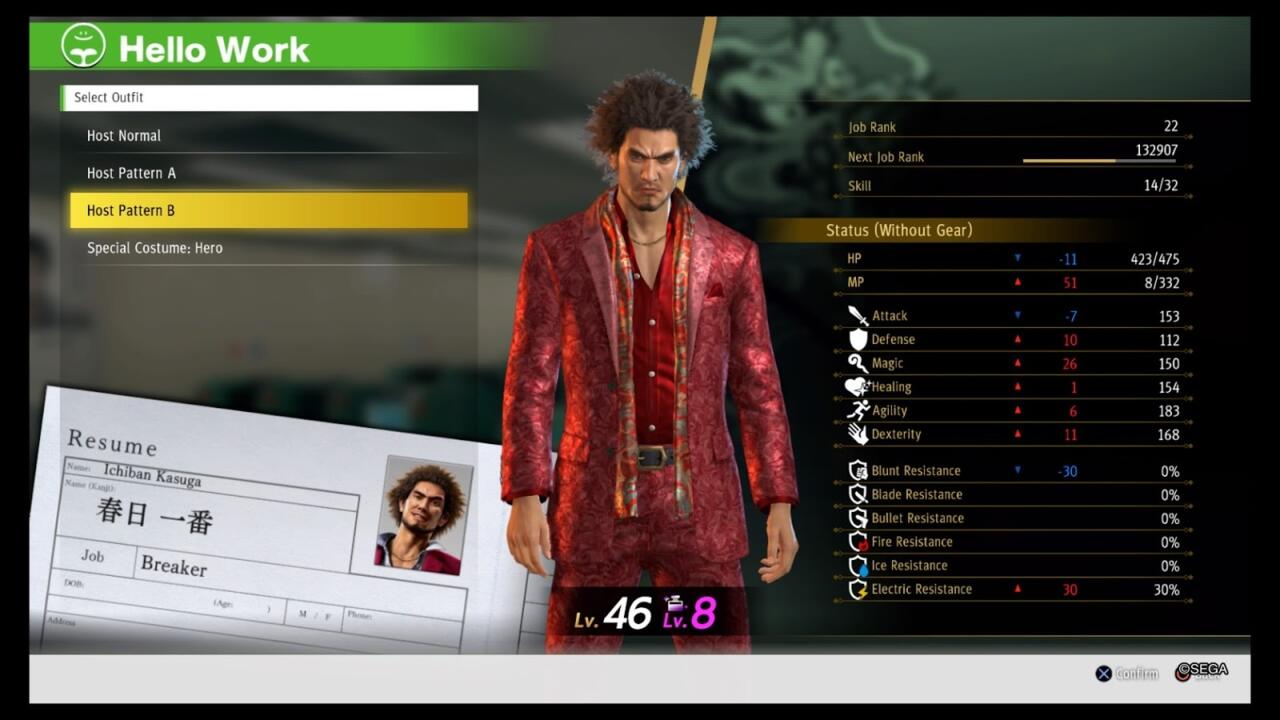
Host is a unique hybrid physical/magic class that does a lot of different things. You’ve got pure blunt damage in the form of techniques like Birthday Bash. You’ve got elemental, status-afflicting skills like Sparkling Splash (which can cause drunkenness and cold), and Rose Stinger (a fire-based skill that can cause charm). And then you’ve got several skills that can steal items from the enemy, if you feel like trying to nab some rare goodies. Top it all off with an MP restore on your regular attacks and you’ve got a good job that covers several bases. The champagne bottles the Host can equip also come with elemental or status-afflicting properties, too, leading to even more strategic possibilities.
Of course, the “jack-of-several-trades” nature means that there isn’t really one area the Host excels in, but in terms of sheer utility, it’s a fine job to have. Perhaps its biggest downside is that the two Character Skills--Ice Bucket and Secret Cocktail--are kind of mediocre in comparison to what other classes give. It’s also worth noting that some Host skills overlap with similar techniques Kasuga learns from the business management minigame and gaining levels, making the class a bit less valuable for him compared to other characters.
TWO-SENTENCE SUMMARY: Host might not be the best job for every situation, but it’s rarely a bad one. A solid complement to many party configurations.
Bodyguard
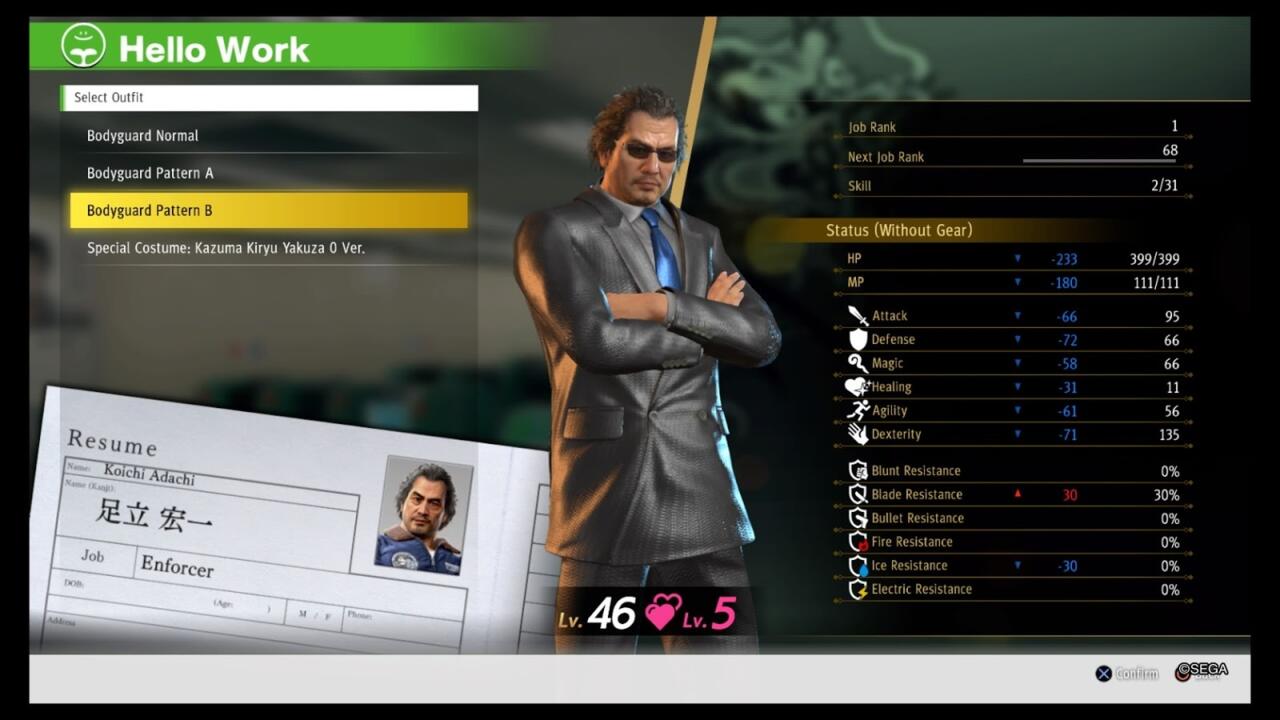
Let’s be upfront: this job is bad. However, it can dish out a lot of damage--skills and normal attacks are slash damage, which can add the bleed status condition to enemies. The bodyguard also has high-damage skills that inflict lots of pain on foes at the cost of the user’s own HP.
But the bodyguard has issues--lots of them. Much like how the Freelancer’s and Breaker’s attacks are entirely blunt, all of the bodyguard’s techniques are slashing damage, which reduces their effectiveness if you’re facing a resistant foe. Bleed is a decent gradual-damage status effect, but it doesn’t restrict a foe’s actions like other, better status ailments do, and the need to live on the edge with low HP and MP to get the most out of certain techniques is a severe demerit that’s also rather luck-dependent. (The low-HP-based attack, Diehard Skewer, also damages you as a side effect, making using it even riskier!) You’ll need lots of support skill users to back up this high-maintenance, high-risk job, and ultimately it’s just not worth the stress.
TWO-SENTENCE SUMMARY: A job that looks and sounds cooler than it actually is. You can skip this one.
Enforcer
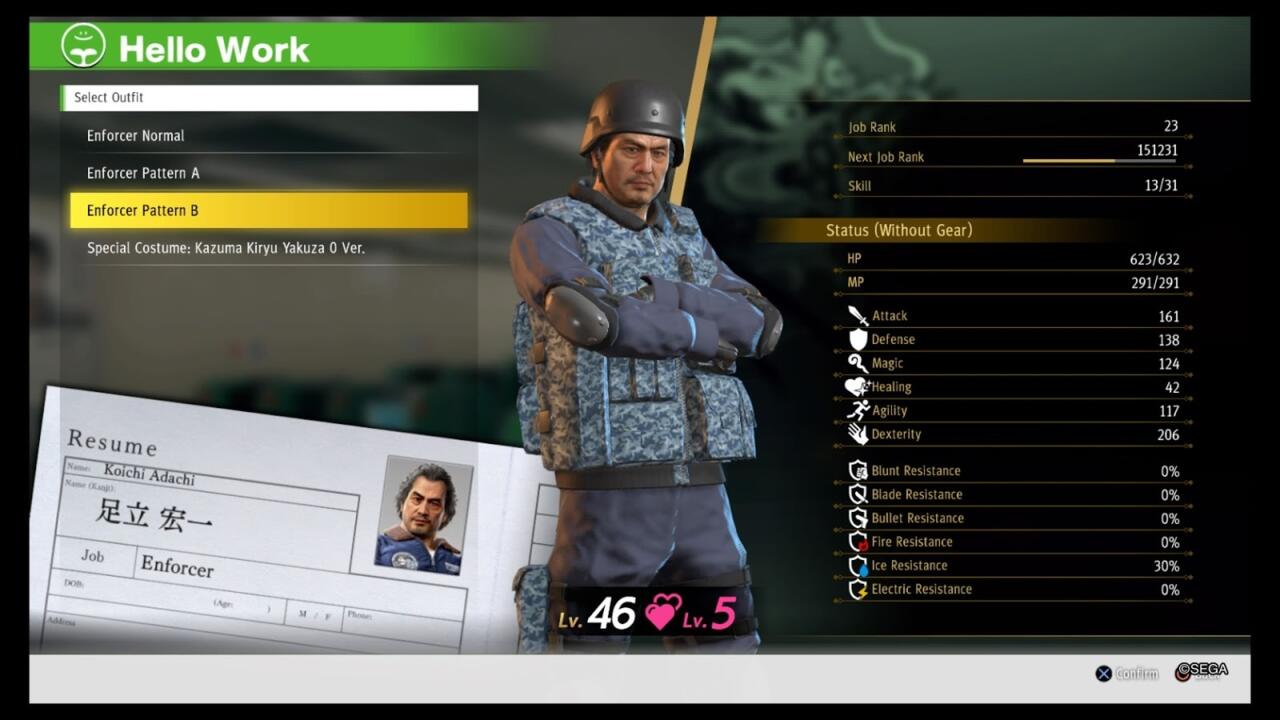
The fact that this class carries a gigantic shield and wears riot gear should clue you in that Enforcers are built for defense. As this job’s level grows, the characters in it will receive considerable buffs to health and defense, though they will lag behind in other areas like speed and dexterity. Speed isn’t the point here, however--the Enforcer exists to soak up damage and strike back with some potent attacks, including the extremely useful (and painful) electric-based Paralysis Prongs. Transfer Shield comes in handy in battles where you want to protect a certain character, as the defense debuffs the Enforcer will get from using the skill are offset by their stat boosts. Adachi in particular is a perfect fit for the Enforcer class: his base stats are naturally tank-y, and he can carry over Detective skills that further help draw aggro onto him and leave enemies stunned.
The Enforcer has one huge drawback, however. Weapons for this class are extremely hard to come by, as most shops in the game don’t stock shields, and the basic starting shield is… not great. Until you find or craft a better shield, the Enforcer’s damage output is going to be lacking, making it hard to recommend switching into this class immediately. Nobody wants a tank that can’t fire back.
TWO-SENTENCE SUMMARY: Enforcer is a superb tank job worth exploring. Provided you’ve got the weapons and time to make it shine, of course.
Chef
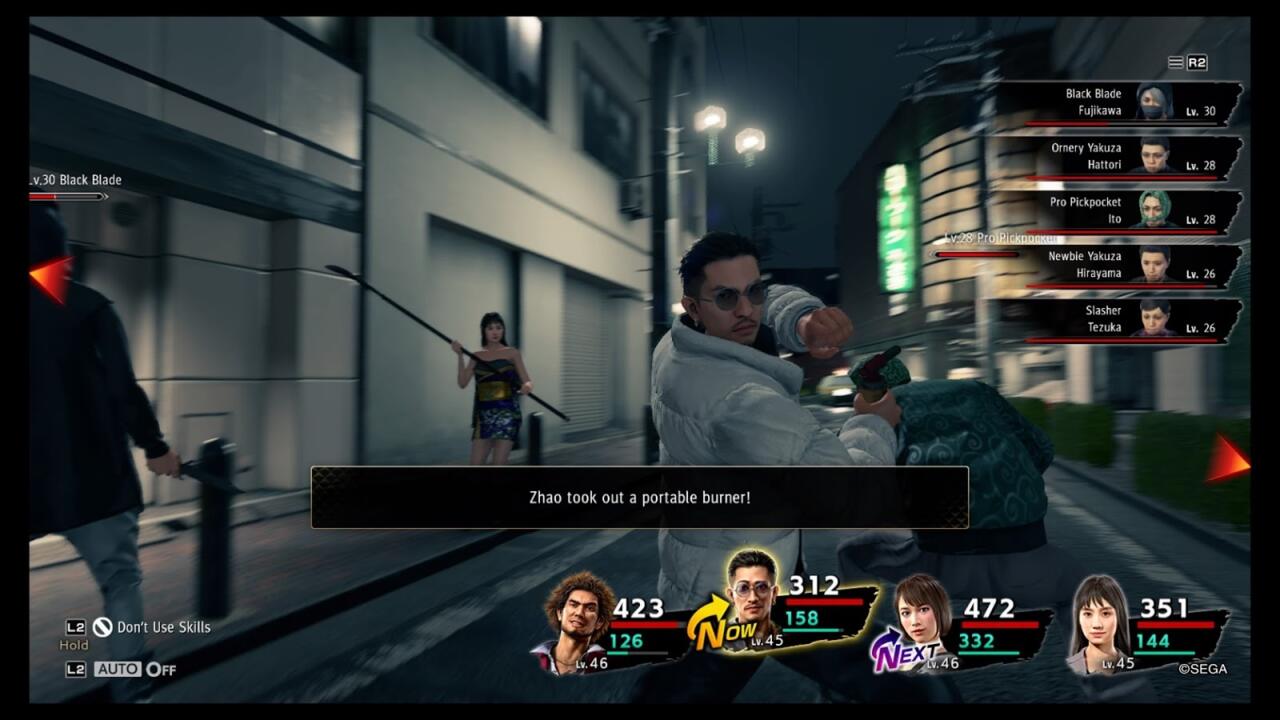
The chef excels at two things: sharp implements and fire, with a peppering of blunt damage to top it all off. That’s a pretty nice mix of damage! Add in some extra agility and magic boosts, and you have a solid hybrid offense class that can whip up a good helping of hurting. The bleeding and burning status effects many of these skills can cause are a nice little side dish, too!
The only downside? This class is strictly offense-based, with nary a support or healing skill to be found, so you’ll either be reliant on items for healing or need to carry over skills from elsewhere. Also, since Nanba has access to many fire skills in his Homeless Guy class, this class may be of slightly less benefit to him. (Though the boosts to magic power are quite nice.)
TWO-SENTENCE SUMMARY: Slice, dice, tenderize, and toast. A very good offensive job with a nice ability mix.
Fortuneteller
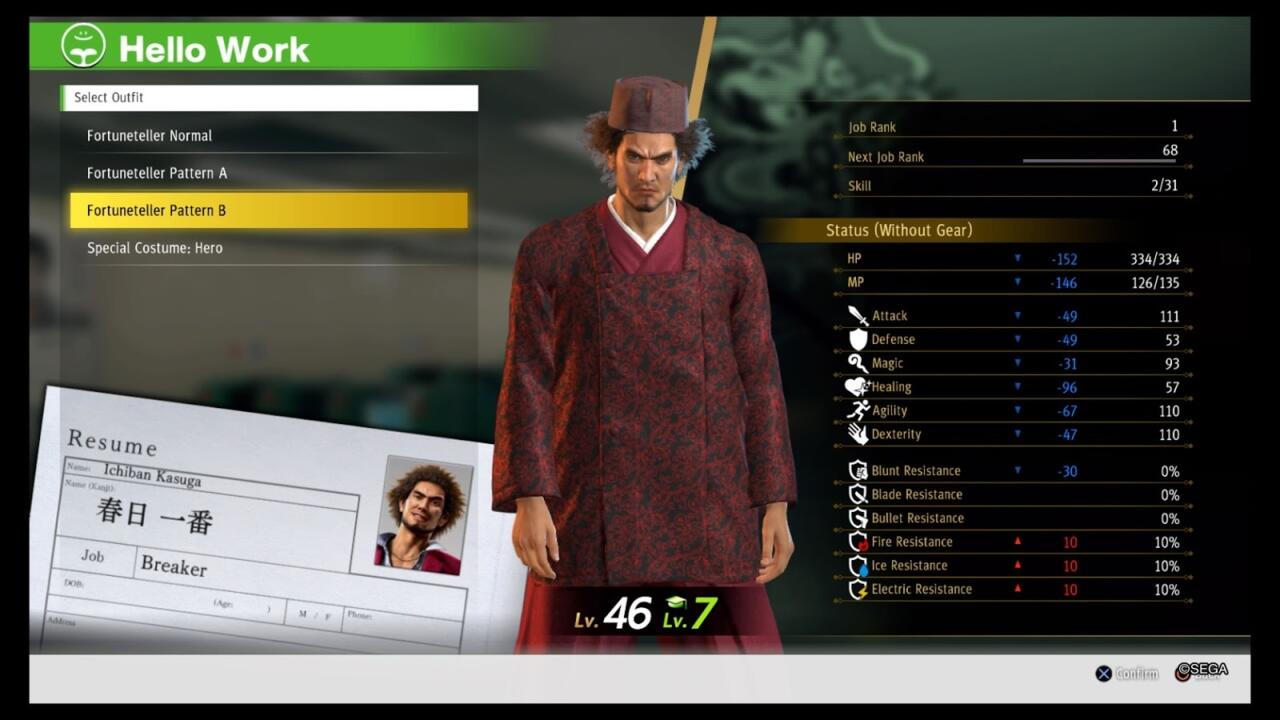
Fortuneteller is the dedicated support class for male characters, and it’s pretty mediocre. It’s got a decent enough mix of skills that buff allies and inflict bad status on enemies. However, the two character skills you can learn from the Fortuneteller class are particularly good: Soul Tether revives a KO’ed party, and Fulminating Forecast is a very strong AOE lighting magic skill.
However, there are a lot of classes in YLAD that have support, debuff, and status-inflicting skills, and a lot of them come with higher damage output or a more versatile toolkit. The Idol job in particular outclasses Fortuneteller in every way, having great healing skills, bad-status-causing strikes, and buff and debuff abilities. Consider learning the job for the character skills, but leave the support to the dancing girls.
TWO SENTENCE SUMMARY: A lot of classes have support skills, so Fortuneteller winds up feeling unnecessary a lot of the time. The character skills are really good, though!
Women-Only Jobs
Idol
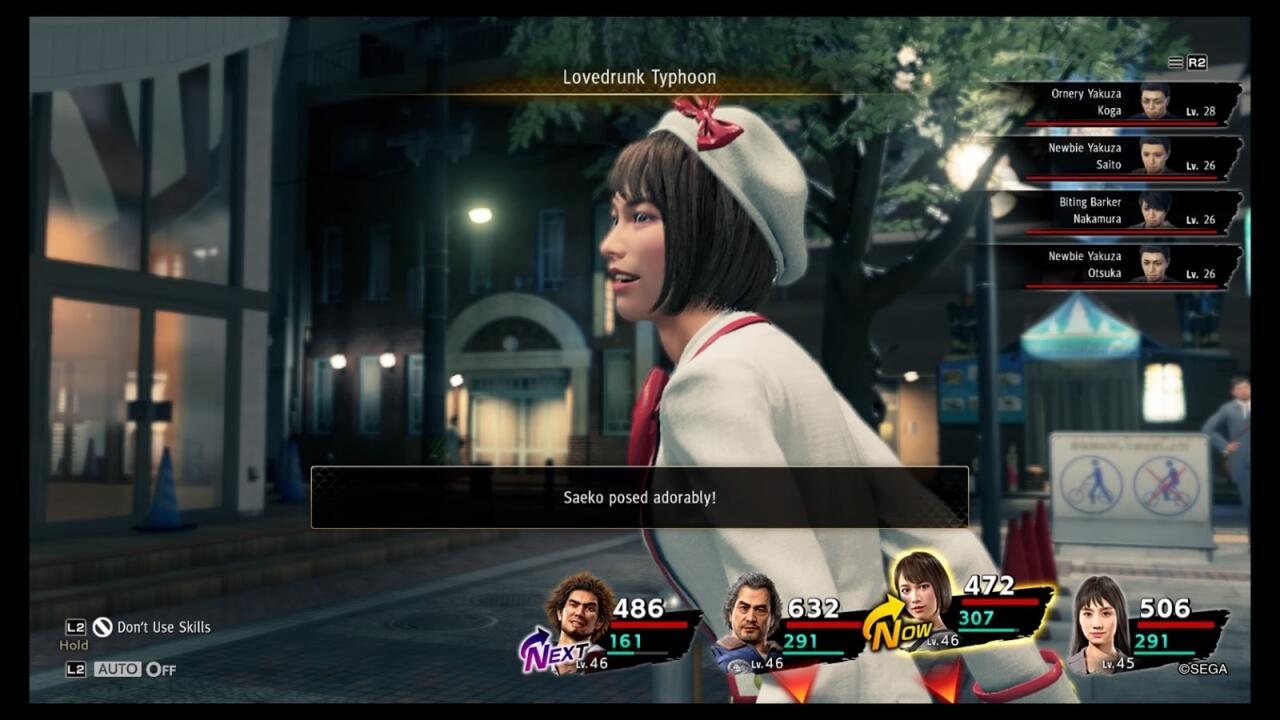
If you want a ray of sunshine in the dark dregs of battle, you’re going to want an Idol in your party. Idols do three things extremely well: they give attack buffs, they heal the party’s HP and status ailments, and they stick particularly potent status ailments on enemies. For example, charm is among Like a Dragon's best status afflictions for crowd control, since it prevents an enemy from doing anything until it wears off--and one of the Idol’s starting skills is Smash Step, an attack that can inflict Charm. After a few levels, you’ll get a skill called Magical Song that heals the whole party for a huge chunk of HP, which is practically essential for some of the harder fights.
Gear for the Idol is easily available, and some of it grants higher odds of status ailment affliction--be sure to make good use of that. Top things off with the ability to recover MP with normal attacks and you’ve got a class that’s on top of the world. Sure, you have somewhat lower HP and defense, but that’s not too hard to compensate for. Besides, it’s not like enemies can hit you when you’ve got them wrapped around your pinky with charm, right?
TWO-SENTENCE SUMMARY: The best support class, bar none. Idols will make your combat experience much happier.
Hostess
Hey, it’s the female version of the Host job, and that job’s good… so this should be good, right? Sadly, Hostess does not have quite the mostest. Gone are many of the fire skills and item thievery techniques, replaced with some decent slash skills and support boosts. Many of the Hostess’s attacks have status afflictions and debuffs built in, which is also a nice benefit.
One big drawback is that most of the Hostess’s skills are single-target, making it extremely bad at crowd control in a game where the vast majority of encounters involve large crowds. The support skills are nice, but if it’s strong support you want, you really should go for the Idol instead. The hostess’s skill variety is useful earlier in the game, but the further you get, the less appealing the class becomes.
TWO-SENTENCE SUMMARY: It’s like the Host class, but not as good. Decent, but nothing too special, and its deficiencies become more prominent the further into the game you get.
Night Queen
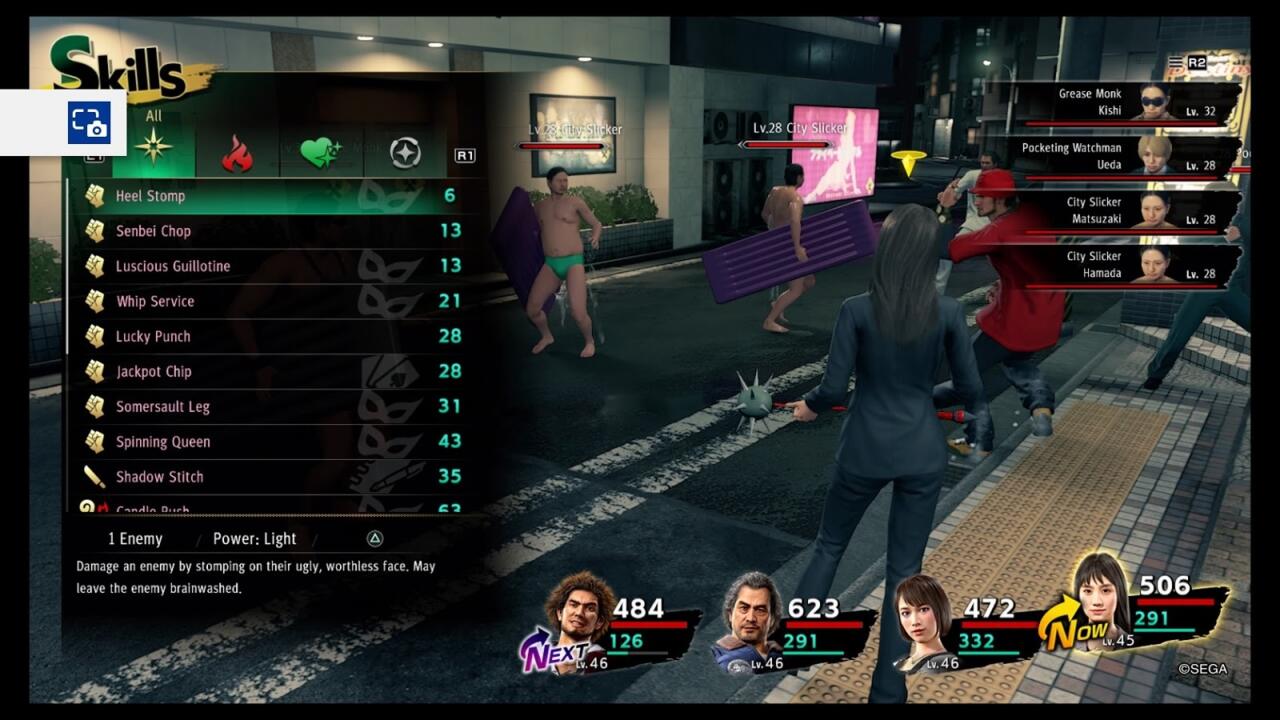
Night Queen is a job that’s all about laying down some physical pain while potentially winning the enemy’s heart in the process. A Night Queen has access to a variety of single-and multi-target blunt-force strikes with the potential for additional damage effects like brainwash, KO, and burn. Literally every single one of her strikes has a possible status ailment attached to it, making her into a highly offensive mistress.
So what’s the problem? Being an attack-focused class isn’t necessarily bad, but the Night Queen’s focus is limited compared to what other women-only classes have to offer. Both the Clerk and the Dealer can inflict a good amount of damage while having access to either multiple kinds of attacks and/or the potential for additional damage. Brainwash is great, when it works… which is never as often as you’d like it to. Still, the two character skills--Somersault Leg and Candle Rush--are excellent AOE attacks, and it’s worth exploring this class if you want more multi-target options for Saeko and Eri. Night Queen isn’t terrible on its own, but it’s hard to advocate for in the face of more versatile options.
TWO-SENTENCE SUMMARY: If you like causing pain, this job’s for you. The character skills that carryover are great as well.
Dealer
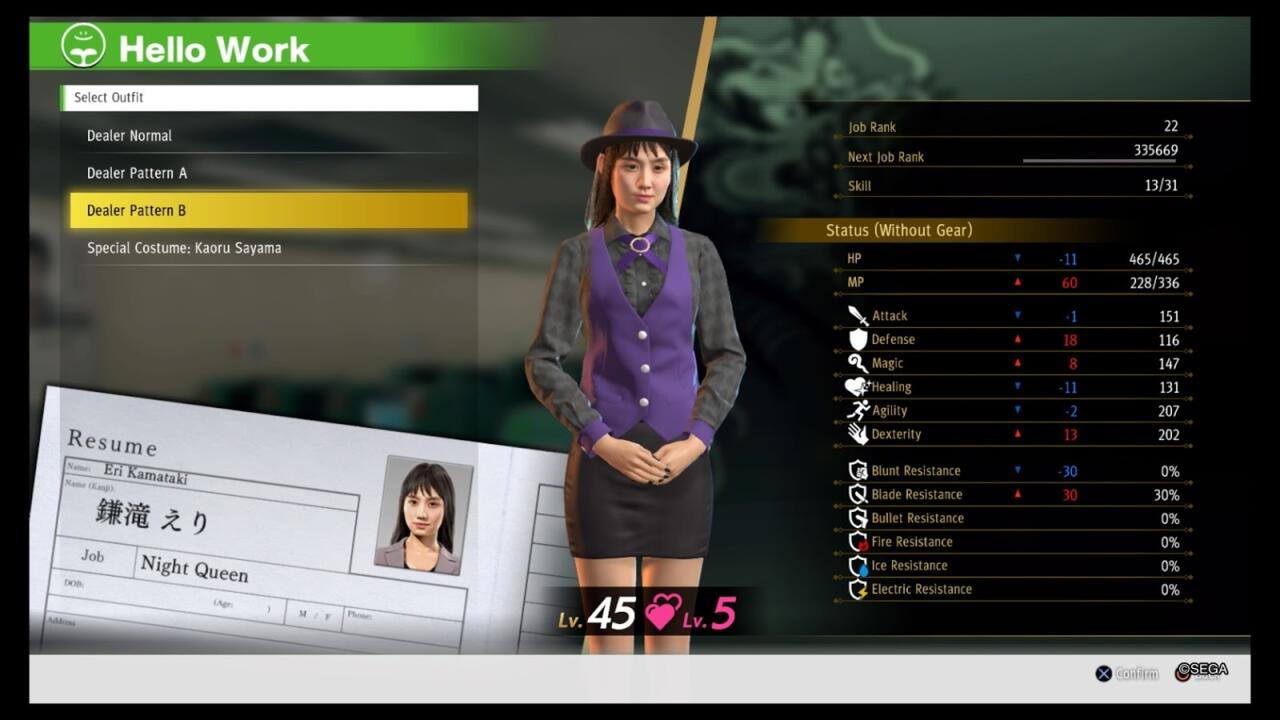
If Bodyguard is a job that sounds cooler than it actually is, Dealer is the opposite. The in-game description sounds like the worst kind of random, gimmicky nonsense that would make it more of a liability than anything. But in actuality, the Dealer is pretty great. In this class, you’ll have access to attack skills that cover all three types of physical damage, but with a bit of a twist: there’s almost always some element of randomness to them. Whether it’s the possibility of boosted damage (Card Sharp) or an AOE piercing attack with randomly selected targets (Darts Airstrike), there’s always an unknown variable involved. Lucky Dice and Unlucky Dice will raise and lower random party member and enemy stats, respectively, adding some support potency to this job as well.
However, what makes the Dealer good is that even when the cards aren’t great, you still inflict a decent amount of pain. There are no self-harming drawbacks like the Bodyguard, nor do you have to spend precious turns trying to build a gauge like the Musician. When the chips are down, the Dealer has a strong potential to pull off an upset.
TWO-SENTENCE SUMMARY: It’s gimmicky, but more often it's an effective job with variety. Surprisingly versatile, too!
Got a news tip or want to contact us directly? Email news@gamespot.com
Join the conversation